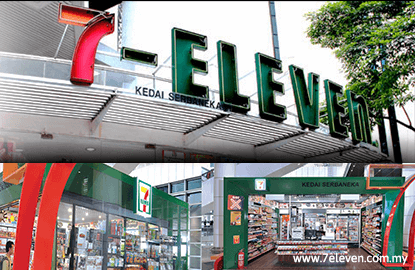
7-Eleven Malaysia Holdings Bhd
(Feb 28, RM1.46)
Maintain reduce with a lower target price (TP) RM1.15: 7-Eleven Malaysia Holdings Bhd’s fourth quarter of 2016 (4QFY16) turnover rose 4.8% year-on-year (y-o-y) to RM523.6 million while its core net profit decreased 31.7% y-o-y to RM9.5 million, bringing its cumulative core net profit to RM52.2 million (-6.5% y-o-y). This missed our and market expectations, accounting for only 91% of both our and Bloomberg consensus estimates. The earnings shortfall was mainly attributable to higher-than-expected operating costs.
The group declared an interim dividend per share (DPS) of 2.3 sen and a special DPS of 2.4 sen, bringing the financial year 2016 (FY16) DPS to 4.7 sen. This is significantly above our expectation of 2.8 sen.
7-Eleven’s FY16 revenue rose 4.8% y-o-y to RM2.1 billion but core net earnings declined 6.5% y-o-y to RM52.2 million. The stronger revenue was driven by improved product mix and growth in number of stores from 1,944 in 2015 to 2,122 in 2016, just 22 stores shy of its initial target of 200 new stores per year. However, this was negated by higher selling and distribution expenses, particularly higher staff costs (impacted by the minimum wage hike in July 2016) which resulted in a y-o-y decrease in core net profit.
The y-o-y sales growth in 4Q16 was on the back of higher number of stores (4Q16: +65 new stores), better merchandise mix and increased consumer promotional activities. Despite that, core net profit fell by a larger quantum on the back of higher operating expenses (+6.8% y-o-y) as a result of higher rental, depreciation and staff costs.
7-Eleven is pushing forward with its strategy of opening 200 new stores as well as refurbishing another 200 stores each year (it refurbished 202 stores in 2016). The group also aims to launch its first mom-and-pop turned franchised store by early March, marking the maiden roll-out of its store conversion programme.
We cut our FY17 to FY18 earnings per share (EPS) by 9% to 11% to account for lower sales and higher operating costs. This reduces our TP to RM1.15, still based on 2018 forecast price-earnings ratio (PER) of 22 times (in line with the average PER of its regional peers).
7-Eleven is currently trading 32 times FY17 and 29 times FY18 PERs, which seems rather stretched against its fairly modest three-year (FY16 to FY19) EPS compound annual growth rate of 11.5%. Better-than-expected recovery in consumer spending is a key upside risk. We prefer Bison Consolidated due to its stronger earnings growth.
— CIMB Research, Feb 27